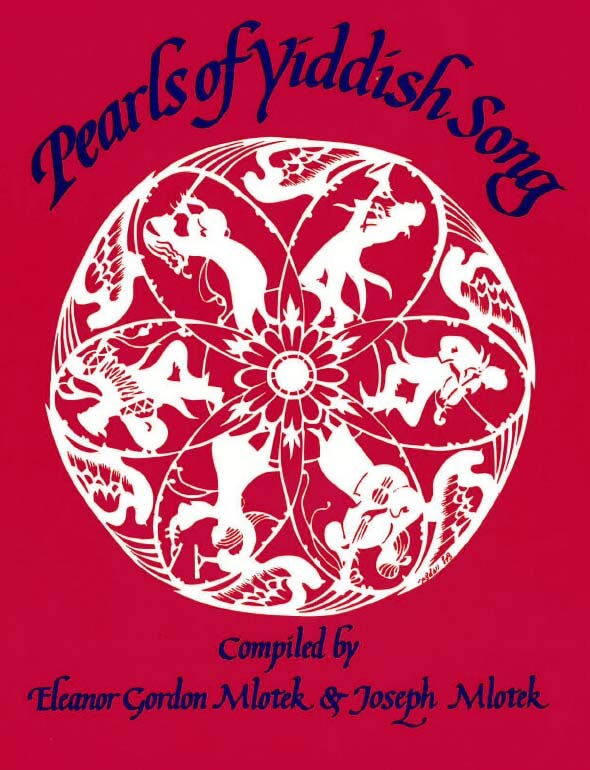Popular children’s song previously published as an anonymous folksong. Actually written by Zalmen Rozental (1892-1959). Text and music published in 1925 by M. Kipnis. In some versions (cf., Mlchel Gelbart, 1937-38) the song begins with “Dort in shtetl.” In Lomir, kinder, zingen, there is an additional stanza: “Brengt a tsigl, meket, meket,/ Shoklt mitn berdl,/ Shpant men ayn di tsig in vogn,/ Vert fun tsig a ferdl.” (He brings a goat that bleats, shakes its beard. They harness the goat to the wagon and the goat becomes a horse). A different melody was recorded by Cantor Moyshe Oysher.

Near the town there is a little house
with a green roof,
and around the house
grow many trees.
And my father, my mother,
Khanele and I,
the four of us have lived together
for a long time.
And father toils and toils,
for all his years,
and he buys for us and brings us
fine, lovely things.
[He] Buys a horse that neighs
and whose name is Mutsik;
Buys a little dog that barks
and whose name is Tsutsik.
Buys a goose with a white neck,
feathers white as snow,
Buys a hen that clucks and clucks
until she lays an egg.
Mother takes these eggs,
oh, what a marvel!
Sets the hen to brood on them,
and we have pretty chicks.
Bay dem shtetl shteyt a shtibl
Mit a grinem dakh
Un arum dem shtibl vaksn
Beymelekh a sakh
Un der tate mit der mamen —
Khanele mit mir,
Shoyn a lange tsayt in eynem
Voynen ale fir.
Un der tate horevet, horevet
Ale yorn zayne,
Un er koyft undz, un er brengt undz
Zakhn sheyne, fayne.
Koyft a ferdl, vos se hirzhet
Mit dem nomen Mutsik;
Koyft a hintl, vos se hafket,
Mit dem nomen Tsutsik.
Koyft a gandz mit a vaysn haldz,
Federlekh vays vi shney,
Koyft a hun, vos kvoket, kvoket,
Biz zi leygt an ey.
Nemt di mame ot di eyer,
Oy, iz dos a moyfes,
Zetst zi oyf oyf zey a kvoke,
Hobn mir sheyne oyfes.
בײַ דעם שטעטל שטײט אַ שטיבל
מיט אַ גרינעם דאַך,
און אַרום דעם שטיבל װאַקסן
בײמעלעך אַ סך.
און דער טאַטע מיט דער מאַמען —
חנהלע מיט מיר,
שױן אַ לאַנגע צײַט אין אײנעם
װױנען אַלע פֿיר.
און דער טאַטע האָרעװעט, האָרעװעט
אַלע יאָרן זײַנע,
און ער קױפֿט אונדז, און ער ברענגט אונדז
זאַכן שײנע, פֿײַנע.
קױפֿט אַ פֿערדל, װאָס סע הירזשעט
מיט דעם נאָמען מוציק;
קױפֿט אַ הינטל, װאָס סע האַפֿקעט,
מיט דעם נאָמען צוציק.
קױפֿט אַ גאַנדז מיט אַ װײַסן האַלדז,
פֿעדערלעך װײַס װי שנײ,
קױפֿט אַ הון, װאָס קװאָקעט, קװאָקעט
ביז זי לײגט אַן אײ.
נעמט די מאַמע אָט די אײער,
אױ, איז דאָס אַ מופֿת;
זעצט זי אױף אױף זײ אַ קװאָקע,
האָבן מיר שײנע עופֿות.
Song Title: Bay Dem Shtetl

First published in 1988 as Pearls of Yiddish Song: Favorite Folk, Art and Theatre Songs, this anthology contains 115 songs. Some material had never been published, while others, included in rare song collections or sheet music, were largely inaccessible. The songs presented reflect Jewish life in Eastern Europe and the United States and depict childhood, love, family celebrations, poverty, work and struggle. There are also songs from the Hasidic and Maskilic movements, songs of Zion and of America, as well as songs from the Yiddish theater.
The title of this anthology derives from the weekly two-page feature column “Pearls of Yiddish Poetry,” which the compilers Yosl and Chana Mlotek initiated in 1970 in the Yiddish newspaper Der Forvertz (the Yiddish Daily Forward). Hundreds of readers from around the world — including authors, composers, singers, actors — became co-participants in this collective folk project and recalled melodies, lines, fragments, stanzas and their variants of songs, poems, and plays which they had heard in their youth. At first, readers sent in only written material. Later, they also taped songs on cassettes, many of whose melodies had, until then, never been recorded. They also identified and supplied missing information regarding lyricists, poets, and composers and described the circumstances surrounding the songs’ origins, their dissemination, diffusion and impact.